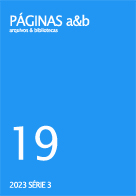Tecnologias Digitais da Informação e Comunicação na Preservação da Memória e da Identidade Cultural de Comunidades Tradicionais
Palavras-chave:
Comunidades tradicionais, Preservação da memória, Sociedade da informação, Tecnologias Digitais da Informação e ComunicaçãoResumo
O presente artigo teve como objetivo identificar o uso das Tecnologias Digitais da Informação e Comunicação - TDIC na preservação da memória e identidade cultural de comunidades tradicionais nas produções científicas da Ciência da Informação no Brasil. Como metodologia utilizou-se a Revisão Sistemática da Literatura com abordagem qualitativa, em que foram pesquisados artigos indexados pela Base de Dados Referenciais de Artigos de Periódicos em Ciência da informação (BRAPCI) publicados no período de 2016 a 2021. Foram analisados os artigos que apresentaram no título, resumo e/ou palavras-chave, a temática preservação da memória/identidade relacionada ao uso das TDIC/TIC e aos povos e comunidades tradicionais do Brasil. Como resultados, aponta-se que foram recuperados poucos trabalhos que estivessem totalmente relacionados à preservação da memória, comunidades tradicionais e a utilização das TIC/TDIC. No entanto, foi possível constatar que as TDIC já vêm sendo utilizadas com o propósito da preservação da memória em diversos contextos. E que além da preservação da memória e identidade cultural, as TDIC utilizadas têm ainda como propósito a disseminação e visibilidade destes povos, a fim de requererem do Estado e da Sociedade o respeito devido e o exercício pleno de sua cidadania.
Referências
ALBUQUERQUE, J. P. S.; SANTANA, C. A.; NUNES, A. M. A. 2018 Lugares de memória em rede: o caso da página Recife de antigamente. In ENANCIB -ENCONTRO NACIONAL DE PESQUISA EM CIÊNCIA DA INFORMAÇÃO, 19º, Londrina 2018 – Anais. [Em linha]. 2018. [Consult. 18 fev. 2022]. Disponível em: http://hdl.handle.net/20.500.11959/brapci/103064.
BAUMAN, Z. 2005 Identidade : entrevista a Benedetto Vecchi. Rio de Janeiro: Zahar, 2005.
BRASIL. Leis, decretos, etc. 2007 Decreto nº 6.040, de 7 de fevereiro de 2007. Institui a Política Nacional de Desenvolvimento Sustentável dos Povos e Comunidades Tradicionais. [Em linha]. Brasília, DF : Presidência da República, 2007. [Consult. 8 fev. 2022]. Disponível em: http://www.planalto.gov.br/ccivil_03/_ato2007-2010/2007/decreto/d6040.htm.
BUFREM, L. S.; SANTOS, S. de F. 2009 Ciência da informação e uso metodológico da etnografia. ETD : Educação Temática Digital. {Em linha]. 11:1 (jul./dez. 2009) 148-174. [Consult. 8 jan. 2022]. Disponível em:https://periodicos.sbu.unicamp.br/ojs/index.php/etd/article/view/921/pdf_106.
CANDAU, J. 2012 Memória e identidade. Trad. Maria Letícia Ferreira. São Paulo : Contexto, 2012.
DUARTE, F. E. G.; SILVA, C. S.; ELLIOTT, A. G. 2018 Memória oral em documentário : as tradições culturais na comunidade sítio Minguiriba, floresta nacional do Araripe, Crato - Ceará. In ENANCIB -ENCONTRO NACIONAL DE PESQUISA EM CIÊNCIA DA INFORMAÇÃO, 19º, Londrina 2018 – Anais. [Em linha]. 2018. [Consult. 18 fev. 2022]. Disponível em: http://hdl.handle.net/20.500.11959/brapci/103675.
GALVÃO, M. C. B.; RICARTE, I. L. M. 2019-2020 Revisão Sistemática da Literatura : conceituação, produção e publicação. Logeion : Filosofia da informação. [Em linha]. 6:1 (set. 2019/fev. 2020) 57-73. [Consult. 10 fev. 2022]. Disponível em: https://sites.usp.br/dms/wp-content/uploads/sites/575/2019/12/Revis%C3%A3o-Sistem%C3%A1tica-de-Literatura.pdf.
LE GOFF 2003 História e memória. 5ª ed. Campinas, SP: Unicamp, 2003.
HALL, S. 2019 A Identidade cultural na pós-modernidade. 12ª ed. Rio de Janeiro : Lamparina, 2019.
LEMOS JÚNIOR, U.; GOSCIOLA, V. 2020 Memória, identidade e digitalização de bens culturais : o legado da missão de pesquisas folclóricas no Brasil. Em Questão. {Em linha]. 26 (2020) 181-205. [Consult. 15 fev. 2022]. Disponível em: https://seer.ufrgs.br/EmQuestao/article/view/105876.
MINISTÉRIO PÚBLICO DE MINAS GERAIS 2019 Coordenadoria de Inclusão e Mobilização Sociais: Direitos dos povos e comunidades tradicionais. [Em linha]. Belo Horizonte-MG: MPMG, [2019]. [Consult. 13 fev. 2022]. Disponível em: https://conflitosambientaismg.lcc.ufmg.br/wp-content/uploads/2014/04/Cartilha-Povos-tradicionais.pdf.
PAIXÃO, C. C;. LEITE, A.M.P. 2021 Natureza viva: a presença das comunidades tradicionais na rádio nacional da amazônia. Comunicação & Informação. {Em linha]. 24 (2021). [Consult. 18 fev. 2022]. Disponível em: https://revistas.ufg.br/ci/article/view/62806/37856.
REVISTA EXAME 2021 Revista Exame. Seção Tecnologia. [Em linha]. (abr. 2021). [Consult. 14 fev. 2022]. Disponível em: https://exame.com/tecnologia/no-pre-covid-brasil-tinha-12-mi-de-familias-sem-acesso-a-internet-em-casa/.
SANTOS, P. W. Q. D.; ALBUQUERQUE, J. P. S. 2017 Redes sociais online como espaços de memória : uma visão a partir da página “Recife de antigamente”. Biblionline. [Em linha]. 13:3 (2017) 107-121. [Consult. 18 fev. 2022]. Disponível em: https://periodicos.ufpb.br/ojs2/index.php/biblio/article/view/35875.
SOUZA, V. 2022 Gente do campo : descubra quais são os 28 povos e comunidades tradicionais do Brasil. [Em linha]. 29 jan. 2022. [Consult. 13 nov. 2022]. Disponível em: https://g1.globo.com/economia/agronegocios/agro-a-industria-riqueza-do-brasil/noticia/2022/01/29/gente-do-campo-descubra-quais-sao-os-28-povos-e-comunidades-tradicionais-do-brasil.ghtml.
TAKAHASHI, T., org. 2000 Sociedade da informação no Brasil : Livro verde. Org. Tadao Takahashi. Brasília : Ministério da Ciência e Tecnologia, 2000.
Downloads
Publicado
Como Citar
Edição
Secção
Licença
Os autores têm autorização para assumir contratos adicionais separadamente, para distribuição não-exclusiva da versão do trabalho publicada nesta revista (ex.: publicar em repositório institucional ou como capítulo de livro), com reconhecimento de autoria e publicação inicial nesta revista.






